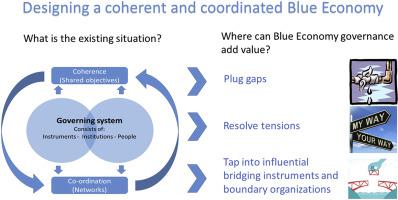当前位置:
X-MOL 学术
›
Ocean Coast Manage.
›
论文详情
Our official English website, www.x-mol.net, welcomes your
feedback! (Note: you will need to create a separate account there.)
Assessing policy coherence and coordination in the sustainable development of a Blue Economy. A case study from Timor Leste
Ocean & Coastal Management ( IF 4.8 ) Pub Date : 2020-07-01 , DOI: 10.1016/j.ocecoaman.2020.105187 Michelle Voyer , Anna K. Farmery , Lana Kajlich , Astrid Vachette , Genevieve Quirk
Ocean & Coastal Management ( IF 4.8 ) Pub Date : 2020-07-01 , DOI: 10.1016/j.ocecoaman.2020.105187 Michelle Voyer , Anna K. Farmery , Lana Kajlich , Astrid Vachette , Genevieve Quirk

|
Abstract The Blue Economy champions the sustainable development of ocean spaces. It is unclear whether this new concept requires a new set of governance principles and policies, or whether existing policy mechanisms can accommodate it. Using Timor Leste as a case study, we examine policy coherence and coordination across a range of maritime sectors. We do so through content analysis of formal instruments, such as legislation and policy documents, and semi-structured interviews with governance actors and organizations. We assess policy coherence by examining whether governance objectives are shared within and across existing sector-based policies, and the extent to which they are consistent with Blue Economy objectives. We explore policy coordination through network analysis of the connections between instruments as well as people. A number of gaps in the Timor Leste policy landscape are apparent, with weak governance around social objectives, particularly in the ports sector. In general, however, the existing governing system appears to be largely consistent with Blue Economy aspirations. In addition, there are existing, highly influential policy documents and organizations that are already playing a critical bridging role between sectors. Strengthening connections between sectoral management arrangements, through boundary organizations and amendments to existing instruments, may therefore be an efficient and pragmatic approach to Blue Economy implementation. This approach would allow more focused attention on plugging policy gaps and addressing deficiencies in the existing system.
中文翻译:

评估蓝色经济可持续发展中的政策一致性和协调性。来自东帝汶的案例研究
摘要 蓝色经济倡导海洋空间的可持续发展。目前尚不清楚这个新概念是否需要一套新的治理原则和政策,或者现有的政策机制是否可以适应它。我们以东帝汶为例,研究了一系列海事部门的政策一致性和协调性。我们通过对正式文书(例如立法和政策文件)的内容分析以及对治理参与者和组织的半结构化访谈来实现这一目标。我们通过检查治理目标是否在现有的基于部门的政策内部和之间共享,以及它们与蓝色经济目标的一致程度来评估政策的一致性。我们通过对工具和人之间的联系进行网络分析来探索政策协调。东帝汶政策格局存在一些明显差距,围绕社会目标的治理薄弱,特别是在港口部门。然而,总的来说,现有的治理体系似乎与蓝色经济的愿望基本一致。此外,现有的、具有高度影响力的政策文件和组织已经在部门之间发挥了关键的桥梁作用。因此,通过边界组织和修订现有文书来加强部门管理安排之间的联系,可能是实施蓝色经济的一种有效且务实的方法。这种方法将使更多的注意力集中在填补政策空白和解决现有系统的缺陷上。围绕社会目标的治理薄弱,特别是在港口部门。然而,总的来说,现有的治理体系似乎与蓝色经济的愿望基本一致。此外,现有的、具有高度影响力的政策文件和组织已经在部门之间发挥了关键的桥梁作用。因此,通过边界组织和修订现有文书来加强部门管理安排之间的联系,可能是实施蓝色经济的一种有效且务实的方法。这种方法将使更多的注意力集中在填补政策空白和解决现有系统的缺陷上。围绕社会目标的治理薄弱,特别是在港口部门。然而,总的来说,现有的治理体系似乎与蓝色经济的愿望基本一致。此外,现有的、具有高度影响力的政策文件和组织已经在部门之间发挥了关键的桥梁作用。因此,通过边界组织和修订现有文书来加强部门管理安排之间的联系,可能是实施蓝色经济的一种有效且务实的方法。这种方法将使更多的注意力集中在填补政策空白和解决现有系统的缺陷上。此外,现有的、具有高度影响力的政策文件和组织已经在部门之间发挥了关键的桥梁作用。因此,通过边界组织和修订现有文书来加强部门管理安排之间的联系,可能是实施蓝色经济的一种有效且务实的方法。这种方法将使更多的注意力集中在填补政策空白和解决现有系统的缺陷上。此外,现有的、具有高度影响力的政策文件和组织已经在部门之间发挥了关键的桥梁作用。因此,通过边界组织和修订现有文书来加强部门管理安排之间的联系,可能是实施蓝色经济的一种有效且务实的方法。这种方法将使更多的注意力集中在填补政策空白和解决现有系统的缺陷上。因此,这可能是实施蓝色经济的一种有效且务实的方法。这种方法将使更多的注意力集中在填补政策空白和解决现有系统的缺陷上。因此,这可能是实施蓝色经济的一种有效且务实的方法。这种方法将使更多的注意力集中在填补政策空白和解决现有系统的缺陷上。
更新日期:2020-07-01
中文翻译:

评估蓝色经济可持续发展中的政策一致性和协调性。来自东帝汶的案例研究
摘要 蓝色经济倡导海洋空间的可持续发展。目前尚不清楚这个新概念是否需要一套新的治理原则和政策,或者现有的政策机制是否可以适应它。我们以东帝汶为例,研究了一系列海事部门的政策一致性和协调性。我们通过对正式文书(例如立法和政策文件)的内容分析以及对治理参与者和组织的半结构化访谈来实现这一目标。我们通过检查治理目标是否在现有的基于部门的政策内部和之间共享,以及它们与蓝色经济目标的一致程度来评估政策的一致性。我们通过对工具和人之间的联系进行网络分析来探索政策协调。东帝汶政策格局存在一些明显差距,围绕社会目标的治理薄弱,特别是在港口部门。然而,总的来说,现有的治理体系似乎与蓝色经济的愿望基本一致。此外,现有的、具有高度影响力的政策文件和组织已经在部门之间发挥了关键的桥梁作用。因此,通过边界组织和修订现有文书来加强部门管理安排之间的联系,可能是实施蓝色经济的一种有效且务实的方法。这种方法将使更多的注意力集中在填补政策空白和解决现有系统的缺陷上。围绕社会目标的治理薄弱,特别是在港口部门。然而,总的来说,现有的治理体系似乎与蓝色经济的愿望基本一致。此外,现有的、具有高度影响力的政策文件和组织已经在部门之间发挥了关键的桥梁作用。因此,通过边界组织和修订现有文书来加强部门管理安排之间的联系,可能是实施蓝色经济的一种有效且务实的方法。这种方法将使更多的注意力集中在填补政策空白和解决现有系统的缺陷上。围绕社会目标的治理薄弱,特别是在港口部门。然而,总的来说,现有的治理体系似乎与蓝色经济的愿望基本一致。此外,现有的、具有高度影响力的政策文件和组织已经在部门之间发挥了关键的桥梁作用。因此,通过边界组织和修订现有文书来加强部门管理安排之间的联系,可能是实施蓝色经济的一种有效且务实的方法。这种方法将使更多的注意力集中在填补政策空白和解决现有系统的缺陷上。此外,现有的、具有高度影响力的政策文件和组织已经在部门之间发挥了关键的桥梁作用。因此,通过边界组织和修订现有文书来加强部门管理安排之间的联系,可能是实施蓝色经济的一种有效且务实的方法。这种方法将使更多的注意力集中在填补政策空白和解决现有系统的缺陷上。此外,现有的、具有高度影响力的政策文件和组织已经在部门之间发挥了关键的桥梁作用。因此,通过边界组织和修订现有文书来加强部门管理安排之间的联系,可能是实施蓝色经济的一种有效且务实的方法。这种方法将使更多的注意力集中在填补政策空白和解决现有系统的缺陷上。因此,这可能是实施蓝色经济的一种有效且务实的方法。这种方法将使更多的注意力集中在填补政策空白和解决现有系统的缺陷上。因此,这可能是实施蓝色经济的一种有效且务实的方法。这种方法将使更多的注意力集中在填补政策空白和解决现有系统的缺陷上。











































 京公网安备 11010802027423号
京公网安备 11010802027423号